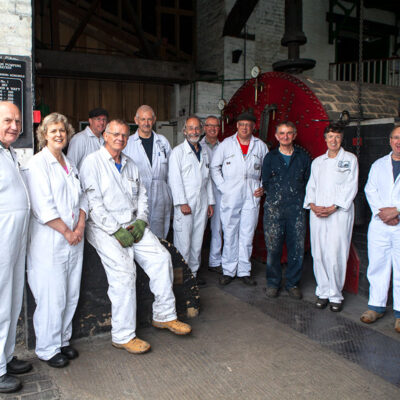Learning Sessions
We are working to develop a broad range of resources and support for schools, including both on-site and outreach opportunities.
Based on the 2014 National Curriculum standards, our sessions cover national and local history, geography, and STEM subjects too.
At present, we have the following learning sessions available:
The Science of Steam Engines and Build a Beam Engine (adapted for Key Stage 2 or Key Stage 3)
Focus:
What are the scientific principles behind steam engines? How does the beam engine at Crofton work?
Overview:
This session takes a quick look at why a pumping station was built at Crofton, before diving into the scientific principles behind how the engines work. The children will see engaging live demonstrations, which involve steam, pressure, vacuum and water. Afterwards, the children work in pairs to build a small working model of the beam engine, which pumps water.
This session is made possible from the Association of Independent Museum’s National Lottery Heritage Funded “New Stories, New Audiences” grant.
National Curriculum Links:
- Observe that some materials change state when they are heated or cooled, and measure or research the temperature at which this happens in degrees Celsius. (Year 4)
- Identify the part played by evaporation and condensation in the water cycle and associate the rate of evaporation with temperature. (Year 4)
- Demonstrate that changes of state are reversible changes. (Year 5)
- The properties of the different states of matter (solid, liquid and gas) in terms of the particle model, including gas pressure. (KS3)
- Changes of state in terms of the particle model. (KS3)
- Forces as pushes or pulls, arising from the interaction between two objects. (KS3)
- Using force arrows in diagrams, balanced and unbalanced forces. (KS3)
How the Canals Changed Wiltshire: A Local History Study (adapted for Key Stage 1 or Key Stage 2)
Focus:
When and why were canals built in the UK? How were they made and who made them?
Overview:
This session looks at the rise of the canal age in the UK, with a focus on the local Kennet & Avon Canal. We look at life in Georgian times, why the canals were built, and how the canals were built before working in groups to become chief engineers, designing our canal. Children will then work in their groups to build their canals using materials we supply.
National Curriculum Links:
History
- Events beyond living memory that are significant nationally or globally.
- Significant historical events, people and places in their own locality. (KS1)
- A local history study. (KS2)
Geography
- Use basic geographical vocabulary to refer to key human features including village, farm, and house as well as key physical features including forest and hill.
- Use locational and directional language to describe the location of features and routes on a map. (KS1)
Human and physical geography: Describe and understand key aspects of human geography, including: types of settlement and land use, economic activity including trade links, and the distribution of natural resources including energy, food, minerals and water (KS2)
Escape Rooms – Escape the Car Park (adaptable for different Key Stages)
Focus
Imagine you’ve been to Crofton Beam Engines for a lovely day out, only to discover as you get ready to leave that the gate has accidentally been locked! To unlock it, you need to collect the seven-digit code for the lock, travelling around the station and solving seven questions, which cover National Curriculum standards, to gain the code
Overview
In this escape room style game, children work in small groups to solve a series of seven questions. Each question is related to a different area of the National Curriculum (English, History, Geography, Science and Maths) and is also connected to Crofton Beam Engines or the canal. Each question takes about ten minutes to solve and generates a number to unlock the code. The session is tailored for Key Stage 1, Lower Key Stage 2, Upper Key Stage 2 or Key Stage 3, and different groups can take part simultaneously. Each question takes about 10 minutes to solves and generates a number to unlock the code. The session is tailored for Key Stage 1, Lower Key Stage 2, Upper Key Stage 2 or Key Stage 3, and different groups can take part simultaneously.
Click on the button below to find out more about this learning experience and how it links to the National Curriclum for each Key Stage
Other sessions are currently under development and will be posted as and when ready. If you have a suggestion of a topic that you would like for us to develop please let us know! All sessions will be tailored to suit the needs of your group.












